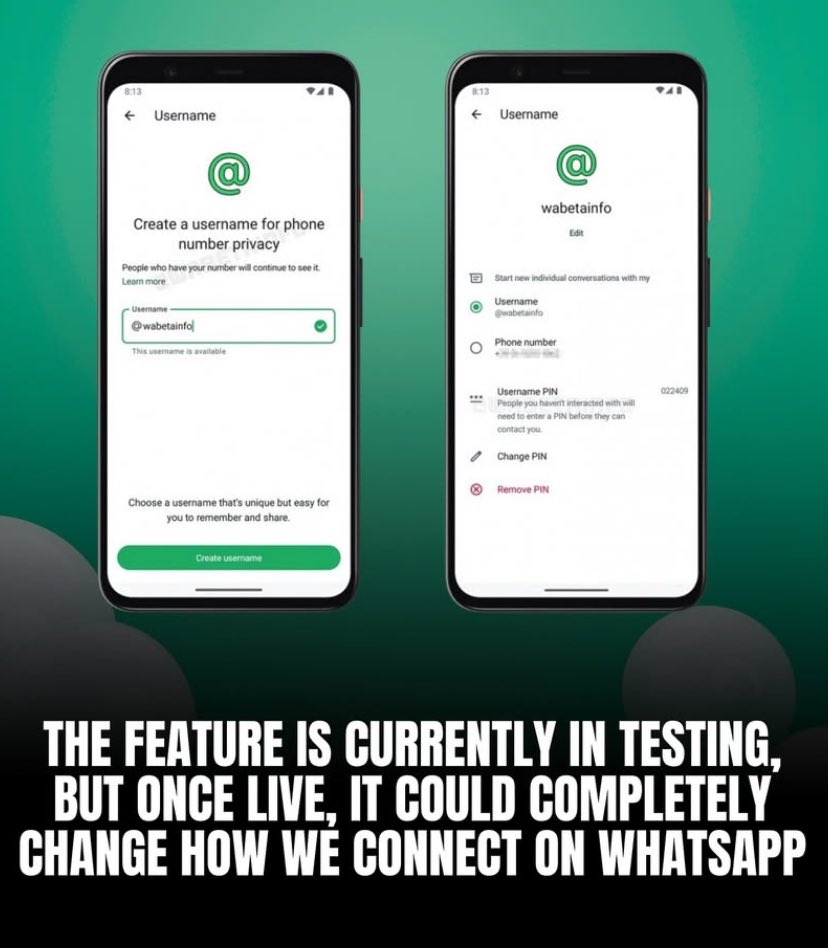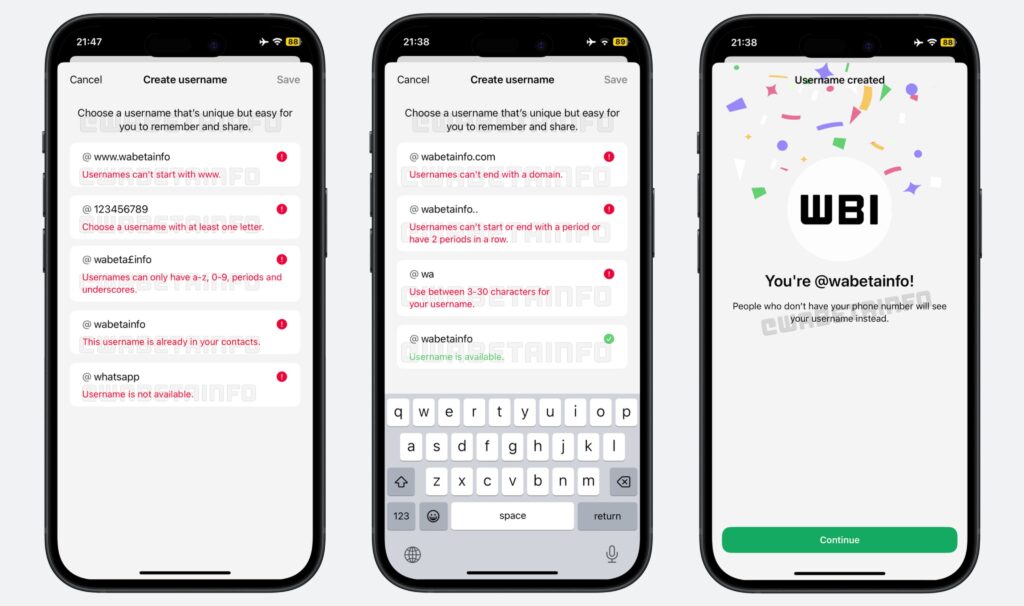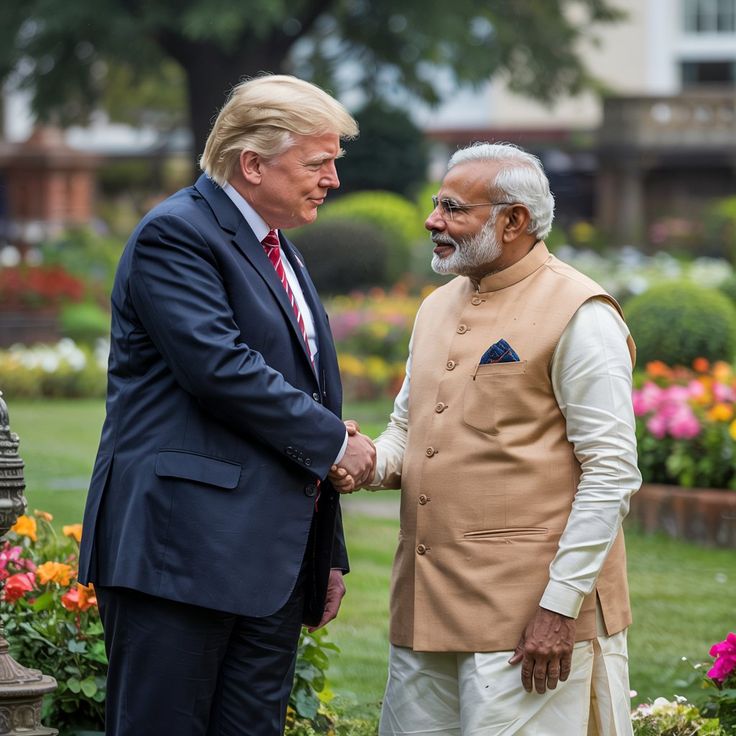In what could be the biggest shift in its decade-long history, WhatsApp the world’s most-used messaging app is testing a new feature that may completely change how users connect and communicate. The company is reportedly developing usernames to replace or supplement phone numbers, marking a major leap toward privacy-first communication.
The feature, which is currently under beta testing, will allow users to create unique usernames that others can use to find and chat with them eliminating the need to share personal phone numbers. If successfully implemented, this could transform how people interact on WhatsApp, offering a more secure, anonymous, and flexible way to connect.
A Major Shift in WhatsApp’s Privacy Policy
For years, WhatsApp has been known for its end-to-end encryption and simple phone-number-based connection system. While this model helped the platform grow exponentially, it has also raised persistent concerns over privacy and spam. Sharing your phone number, especially in large groups or public communities, often leads to unwanted messages, data exposure, or even harassment.
Now, WhatsApp appears ready to change that. The upcoming username feature will give users more control over their digital identity. Instead of relying solely on a phone number, each user can pick a unique handle similar to how Telegram, Instagram, or X (formerly Twitter) work.
This development suggests WhatsApp is moving toward a privacy-forward model, one that aligns with global trends in online communication where anonymity and user protection are becoming top priorities.
How WhatsApp’s Username Feature Works
According to early leaks from WhatsApp beta versions, users will soon see a new “Username” section within their Account Settings. Here, they’ll be able to create a custom username likely unique, and possibly with certain character restrictions.
This username will then serve as a public-facing identity, allowing others to find and message the user without ever needing their phone number. For instance, instead of sharing “+91 9876543210,” a user could simply share a handle like @johnsmith or @travelbuddy123.
It’s still unclear how these usernames will integrate with existing contact lists and privacy settings, but WhatsApp insiders suggest that users will have full control over who can see their username, who can contact them, and whether their phone number remains visible.
A Step Inspired by Telegram and Instagram
The concept of using usernames instead of personal contact numbers isn’t entirely new. Messaging apps such as Telegram and Signal, as well as social platforms like Instagram, already allow users to interact via handles.
Telegram, in particular, has long offered users the ability to hide their phone numbers completely, using usernames to maintain privacy in large group chats or public channels.
WhatsApp’s latest move appears to mirror this strategy but with the added advantage of Meta’s massive ecosystem integration. If WhatsApp successfully merges this username system with its Meta framework, it could become the largest privacy-based user identification shift in modern communication apps.
Early Beta Testing and Interface Previews
Reports from WhatsApp’s beta tracker, WABetaInfo, have shown screenshots of the new username setup page within the beta version of WhatsApp. The feature reportedly appears under Settings → Profile → Username, where users can choose and edit their unique handle.
This suggests that the company is in active testing mode, and internal teams are evaluating how usernames interact with existing contact mechanisms, privacy filters, and chat invitations.
Once finalized, the feature is expected to roll out first to Android beta testers, followed by iOS users, before making its way to the global stable release.
Why This Matters: A Revolution in User Privacy
The introduction of usernames could be one of WhatsApp’s most significant privacy upgrades ever. Currently, sharing your phone number is unavoidable when joining group chats, business channels, or community forums. This exposes users to various risks, including spam, phishing attempts, and data harvesting.
By switching to usernames, WhatsApp could eliminate this long-standing issue. Users would finally have the freedom to:
- Join groups or channels anonymously without revealing personal numbers.
- Chat with new people securely while maintaining their privacy.
- Avoid spam and data leaks, since numbers won’t be publicly visible.
- Control their identity through customizable usernames instead of fixed digits.
This move also aligns with global data protection laws like GDPR and India’s Digital Personal Data Protection Act (DPDPA) 2023, which emphasize user consent and information security.
Potential Concerns: Impersonation and Fake Accounts
While the username feature brings massive benefits, it also raises new challenges. Experts have voiced concerns about impersonation, fake profiles, and username squatting issues that platforms like Instagram and Twitter have struggled with for years.
For example, someone could register a username similar to a celebrity, brand, or even a friend’s name to mislead users. This could create opportunities for scams, misinformation, and phishing.
To prevent such misuse, WhatsApp is reportedly working on verification systems and protection mechanisms that will verify account authenticity. This might include:
- Username verification badges for verified users or businesses.
- AI-based impersonation detection tools.
- Dispute resolution systems to reclaim squatted usernames.
- Two-step verification for identity protection.
- WhatsApp’s Focus on Security and Verification
According to insider reports, WhatsApp’s parent company Meta is actively developing account verification tools and enhanced security layers to ensure a safe transition to the username-based model.
This could mean integrating username verification with WhatsApp’s existing phone verification process ensuring that even though users interact via usernames, their accounts remain tied to a verified mobile number behind the scenes.
Additionally, Meta might implement backend protection systems similar to those on Instagram and Facebook, which automatically flag suspicious activity and fake accounts.
Impact on Businesses and Communities
If WhatsApp rolls out usernames globally, it could also redefine how businesses, influencers, and community leaders engage with audiences.
Currently, WhatsApp Business accounts depend heavily on phone numbers for identification. A username system could allow businesses to operate under brand-specific handles, like @CaféMochaOfficial or @TechGuruSupport, improving brand visibility while safeguarding staff privacy.
Similarly, large public groups and communities such as event organizers, NGOs, or online learning networks could use usernames to manage members without exposing personal contact details.
This change could even inspire new monetization and discovery features, such as username search directories or verified handle badges for premium users.
A Part of WhatsApp’s Larger Vision for Privacy
This isn’t the first time WhatsApp has made strides toward user privacy. Over the past few years, the platform has rolled out several significant updates:
- Disappearing messages and view-once photos/videos for temporary sharing.
- Privacy controls for “Last Seen,” “Online Status,” and “Profile Photo.”
- Chat lock and hidden folders for sensitive conversations.
- Device linking without keeping the phone online, allowing users to manage chats on multiple devices securely.
The introduction of usernames seems like a natural evolution of these features giving users even more autonomy over how they appear and interact online.
User Reactions: Excitement and Curiosity
Although the feature is still in testing, early reactions across social media have been largely positive. Many users have praised WhatsApp for finally catching up with platforms like Telegram, which have long offered privacy-focused interaction models.
However, others remain cautious. Some users fear that usernames could make it easier for unknown people to find and message them, potentially leading to new types of spam or abuse.
To mitigate this, WhatsApp is expected to include granular privacy settings, allowing users to choose who can search or message them by username such as “Everyone,” “Contacts Only,” or “Nobody.”
A New Era of Digital Identity on WhatsApp
The shift from phone numbers to usernames isn’t just a feature update it represents a philosophical change in how WhatsApp views online communication. It marks a move from personal information sharing to identity control and privacy empowerment.
In a world increasingly defined by data breaches and surveillance concerns, giving users the ability to connect without compromising their privacy could make WhatsApp even more indispensable.
Moreover, as Meta continues integrating AI-driven moderation tools and cross-platform features, usernames could also serve as a bridge between WhatsApp, Instagram, and Facebook Messenger allowing seamless communication across apps under a single identity.
When Will WhatsApp Usernames Be Available?
As of now, WhatsApp hasn’t announced an official release date for the username feature. It remains in the beta phase, and developers are reportedly refining it for a stable rollout.
Typically, WhatsApp tests new features for several weeks or even months before releasing them publicly. Experts predict that the username update could be officially introduced sometime in early 2026, once all privacy, security, and verification mechanisms are perfected.
The Bottom Line: A Landmark Update in Messaging Privacy
If fully implemented, WhatsApp’s username feature could mark one of the most important milestones in digital communication since the platform’s inception. It gives users more control, stronger privacy, and greater flexibility all while keeping WhatsApp’s simplicity intact.
By eliminating the need to share phone numbers, WhatsApp is addressing one of the most pressing privacy concerns in modern messaging. The move could reshape how billions of users around the world connect, communicate, and collaborate online.
As WhatsApp continues testing and refining the feature, one thing is clear the future of private messaging is about to get a lot more personal, secure, and user-controlled.
Related News: Read More





